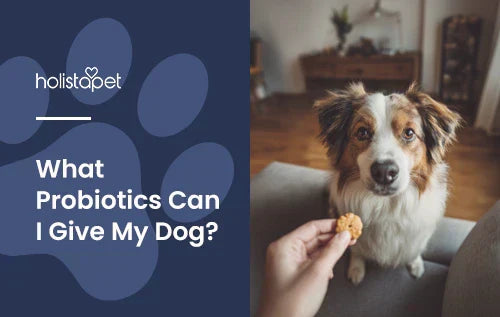Every pup's tummy needs a little backup, and that's where probiotics shine. If you're wondering, "What probiotics can I give my dog?", the answer lies in pup-friendly strains that keep the gut balanced and happy. These friendly bacteria work hard to support smooth digestion, robust immunity, and healthy skin.
You'll find probiotics for dogs in certain dog foods and supplements. Some pet parents turn to yogurt or coconut milk kefir, as long as they stay unsweetened and safe for canines. With a little consistency, probiotics can help your furry friend feel more comfortable from the inside out.
Why Dogs Benefit from Probiotics

The best probiotics for dogs keep your pup balanced inside and out. These good bacteria line the gastrointestinal (GI) tract, crowding out harmful bacteria and giving the gut a smoother ride. A dog with a balanced gut flora tends to digest food better, have firmer stools, and experience fewer stomach troubles.
Probiotics can also help boost immunity by strengthening the body's natural defenses. Owners often notice their pets bounce back faster after antibiotic treatments when probiotics are part of the mix.
Digestive Support and Stool Regulation
Probiotics in dogs work like tiny helpers that guide food through the digestive tract. They add good gut bacteria that aid in breaking down meals, so nutrients get absorbed the right way. With better digestion, most pups feel more comfortable and have less gas or stomach troubles.
Another big plus is stool quality. Probiotics can firm up loose stool, making bathroom breaks more regular. Pet parents who give their dogs probiotics often see results in just a few days.
Immune System Health
A strong immune system often starts in the gut, and probiotics play a big role in keeping it steady. These beneficial microorganisms help guard against harmful bacteria while supporting the growth of good bacteria. With this balance, your dog's body can fight off challenges more easily and bounce back with less trouble.
Giving your dog probiotics may also reduce immune system issues linked to an upset gut. Many owners notice fewer colds, less itching, and improved energy when healthy bacteria are present.
Skin Support and Allergy Relief
Another benefit of probiotics is skin support. By building up healthy gut bacteria, probiotics may reduce skin irritation caused by poor digestion or food allergies. A balanced gut supports smoother nutrient absorption, which in turn helps nourish the skin and coat.
Some dogs with frequent rashes or breakouts see fewer flare-ups after consistent probiotic intake. Owners often find their pets scratch less and show fewer signs of discomfort.
What Types of Probiotics Can I Give My Dog?
Several types of probiotics can support your pup's gut health. Each form has its own perks, whether it's convenience, taste, or ease of mixing with dog foods. Canine-safe probiotics come in powders, chews, tablets, and even probiotic-rich human foods. Choosing the right one depends on your pet's habits and what fits smoothly into their daily routine.
Are Human Probiotics Okay for Dogs?
Human probiotics are not the best choice for dogs because they may contain strains that don't fit a dog's gut. Some products even include ingredients like artificial sweeteners that are unsafe for pets. While both dogs and humans need probiotics, the balance in their digestive systems is different.
Pet-specific probiotics are safer and more reliable. They contain good bacteria tested for dogs and usually come in tasty forms like chews or powders. By choosing probiotics made for pets, you protect your dog's health while giving them the right support for their gut.
What Forms of Probiotics Can I Give My Dog?
Probiotics for dogs come in several easy forms, so you can pick what works best for your pup. Here are the common formats you'll find:
- Powders
- Chews and Treats
- Capsules and Tablets
- Probiotic-Rich Foods
Powders
Probiotic powder is one of the easiest ways to add good bacteria to your dog's meals. It mixes well with food and lets you sprinkle a measured scoop right on top. It also doesn't change the taste of dog food too much.
Many powders contain billions of live probiotic bacteria that go straight to work in the gut. Some also include prebiotics that help feed friendly bacteria. With regular use, probiotic powders support digestive health and help restore desirable intestinal microbial balance.
Chews and Treats
Probiotic chews and treats make giving your dog probiotics simple and fun. They look and taste like regular snacks, so most pets gobble them up without hesitation. Each chew carries billions of live microorganisms designed to support the gut and overall health.
These treats often mix good bacteria with ingredients like pumpkin or sweet potato. That combo supports digestive health while keeping your pup excited for their daily dose. For many owners, probiotic chews are the easiest way to keep a dog's gut balanced and their stool firm and regular.
Capsules and Tablets
Capsules and tablets give owners a straightforward way to give their dogs probiotics. Each one contains a set number of live bacteria, so you always know the dose. Some pets take them like regular pills, while others need them hidden in a piece of food.
These forms work well for owners who want a simple, no-mess option. Capsules and tablets are also less likely to spoil because they're sealed away from air and moisture.
Probiotic-Rich Foods
Some owners prefer giving probiotics through foods that naturally contain good bacteria. Options like plain yogurt, unsweetened kefir, or coconut milk kefir can provide live cultures that are safe for dogs. These foods help introduce beneficial microorganisms into the GI tract while keeping mealtime tasty.
When choosing probiotic foods, always feed your dog plain versions with no artificial sweeteners. With careful picks, probiotic-rich foods give dogs a natural boost that supports digestion and overall immune health.
What Strains of Probiotics Are Good for Dogs?
Dog-safe strains like Lactobacillus and Bifidobacterium are the most common in probiotic supplements. These beneficial microorganisms bring balance to the gut and help improve stool quality.
Not all probiotic bacteria work the same way in a dog's gut. Some strains focus on breaking down food, while others support immune health or help ease stomach troubles. The right mix of strains gives steady support, whether the goal is smoother digestion, stronger immunity, or relief for sensitive stomachs.
Best Probiotic Strains for Digestion
Probiotics that support digestion give dogs a smoother way to process food and absorb nutrients. They add beneficial gut bacteria that help regulate the stomach and promote consistent stool quality. These strains are often found in probiotic products made for dogs.
- Lactobacillus acidophilus. Supports nutrient absorption and helps maintain balanced gut flora.
- Bifidobacterium animalis. Aids in digestion and helps regulate stool quality.
- Lactobacillus casei. Helps break down food efficiently and supports nutrient uptake.
- Bifidobacterium breve. Assists with reducing gas and bloating in sensitive dogs.
Best Probiotic Strains for Immune Support
Some probiotics focus on keeping a dog's immune system ready and strong. These strains encourage healthy gut bacteria that help block harmful bacteria from causing trouble. With steady use, they can give your dog's defenses a much-needed boost.
- Enterococcus faecium. Promotes healthy gut bacteria and boosts immune defenses.
- Lactobacillus plantarum. Contributes to gut balance and helps protect against harmful bacteria.
Best Probiotic Strains for Sensitive Stomachs
Dogs with sensitive stomachs often need strains that help calm irritation and bring balance back to the gut. These probiotics are gentle yet effective, supporting smoother digestion without upsetting the system further. Owners find them especially helpful after stomach troubles or antibiotic treatments.
- Lactobacillus rhamnosus. Known to help ease diarrhea and support digestive recovery.
- Bacillus coagulans. A resilient strain that helps maintain long-term gut health and stability.
How To Choose the Right Probiotic for Your Dog
Picking the right probiotic starts with looking for blends made just for dogs. These formulas contain strains tested for canine digestive tracts, making them safer and more effective than human products. Labels that list billions of live bacteria and clear strain names are a good sign of quality. Dog foods with probiotics or probiotic supplements all work, but consistency matters most.
Pro tip: HolistaPet probiotic chews are a top option because they mix helpful gut bacteria with tasty, dog-safe ingredients. With steady use, they help restore desirable intestinal microbial balance and support long-term wellness.
Safe Dosage Guidelines for Dogs
Starting slow is the best way to give your dog probiotics. Begin with a small dose to let your pup's gut adjust, then work up to the full amount in the following days. This gradual method helps reduce stomach troubles and keeps the process gentle.
Dosage often depends on a dog's size, breed, and overall condition. Small breeds may need fewer live microorganisms, while larger canines usually need more to see results. Always follow the directions on the label or from your vet, and keep your furry friend on a steady routine for the best support.
Featured Product: HolistaPet Probiotics for Dogs

HolistaPet's Probiotics for Dogs Wellness Soft Chews give a tasty way to support canine digestive health and overall well-being. Each heart-shaped chew holds a powerful blend of nine probiotic strains, including Lactobacillus acidophilus, L. casei, L. salivarius, L. plantarum, L. rhamnosus, L. brevis, Bifidobacterium bifidum, Streptococcus thermophilus, and B. lactis/longum. Together, these strains deliver 3 billion CFU (colony-forming units) of live microorganisms.
These chews also feature pumpkin and sweet potato, which add fiber for smoother digestion. Suitable for dogs of all breeds and sizes, this formula helps restore balance in the GI tract, reduce skin irritation, and support immune health. With HolistaPet's Probiotic Chews, our canine friends enjoy better digestion, improved comfort, and lasting wellness.
When To Expect Results from Dog Probiotics
Probiotics for dogs can start working quickly, but full benefits take time. Some owners notice changes within the first couple of days, while deeper improvements show up after steady intake. Here's a simple timeline:
Initial Relief – First 24 to 48 Hours
Some dogs may show early relief from mild diarrhea, gas, or bloating within the first day or two. Example: loose stool firming up slightly after a probiotic dose.
Short-Term Results – 1 to 2 Weeks
Most pet parents notice clearer improvements after consistent supplementation. Example: regular bowel movements, less smelly gas, and a calmer tummy.
Long-Term Benefits – 4 Weeks and Beyond
With steady daily use, probiotics support deeper balance. Example: stronger immunity, improved skin health, and overall better energy.
Possible Side Effects of Probiotics in Dogs
Most dogs handle probiotics without trouble, but some may show minor reactions in the beginning. These side effects usually appear as the gut adjusts to new helpful bacteria. Keeping an eye on your pup during the first few days helps you spot anything unusual, such as:
- Gas. Some dogs may pass more gas while their system adapts to the new bacteria.
- Loose Stools. Softer or more frequent stools can happen during the early adjustment phase.
- Queasiness. A few dogs may show mild stomach troubles, such as an upset stomach.
- Ongoing Discomfort. If signs last more than a few days, consult a vet for guidance.
FAQs – Dog Probiotics
Understanding the basics of dog probiotics can make it easier to pick safe options. From strains to dosage, these common questions help guide the way. Keep reading, so you can make confident choices for your dog's health.
What types of probiotics can I give my dog for digestive issues?
Probiotics that target digestion focus on adding beneficial bacteria to your dog's gut. Many probiotic supplements list Lactobacillus acidophilus or Bifidobacterium animalis as key strains for smoother digestion. These help break down food, absorb nutrients, and keep stool quality steady.
You'll also find the right probiotics in dog foods, powders, or tasty chews designed to support the digestive tract. With steady intake, these specific probiotics firm up dog poop, reduce gas, and keep the gut balanced.
What forms of probiotics can I give my dog safely?
Safe options include powders, chews, capsules, and probiotic-rich foods made for dogs. Powders mix easily with meals, while chews feel like tasty treats. Capsules and tablets deliver measured doses for steady results. Probiotic foods like plain yogurt or coconut milk kefir also work if they are free from artificial sweeteners.
The best choice depends on your dog's eating habits and your routine. Some owners prefer powders for control, while others stick with chews for convenience. All of these forms provide helpful bacteria that support a healthy gut and smoother digestion.
What probiotics should be avoided in dogs?
Dogs should not take probiotics that contain artificial sweeteners, unsafe human strains, or fillers that may upset the stomach. Certain human probiotics are not tested for canine use and may not survive in a dog's gut. These products could throw off intestinal microbial balance rather than restore it.
Always check labels for plain, dog-safe ingredients. Avoid anything that may contain artificial sweeteners like xylitol, which is harmful to pets. Sticking to pet-specific options helps your dog receive strains designed to work safely in their system.
What strains of probiotics are good for dogs with sensitive stomachs?
Dogs with sensitive stomachs need strains that calm irritation and gently restore balance. Lactobacillus rhamnosus is well-known for helping pups recover from diarrhea and easing stomach troubles. Another solid option is Bacillus coagulans, a strong strain that supports long-term gut stability.
These strains often appear in probiotic supplements made for digestive health. When given daily, they reduce gas, regulate stools, and soothe upset stomachs. Pet owners often see improvements within a few days to a few weeks, depending on the dog.
Can probiotics be given daily to dogs?
Yes, owners can give their dogs probiotics daily. Regular use often brings the best results. Daily doses keep beneficial bacteria active in the digestive tract, supporting consistent stool quality and immune health. Skipping days may reduce their impact and delay long-term benefits.
Most dogs do well on a steady probiotic routine, whether in chews, powders, or probiotic foods. Always follow the dosage instructions on the product or from your vet.
Final Thoughts on What Probiotics To Give Dogs
Probiotics for dogs can bring big benefits, from firmer stools to stronger immune health. Choosing safe, pet-specific products keeps your pup comfortable and helps restore balance in their digestive tract. With the right strains and steady intake, probiotics support smoother digestion, calmer skin, and a happier belly.
For pet owners looking for a trusted choice, HolistaPet's Probiotic Soft Chews stand out. They combine billions of live probiotic bacteria with pumpkin and sweet potato for added digestive support. Simple, tasty, and made for pups of all sizes, these chews make daily wellness easy and reliable.


 CBD Oil for Dogs - Fast Acting
CBD Oil for Dogs - Fast Acting
 Chicken Flavored CBD Oil For Dogs - Easy Dose
Chicken Flavored CBD Oil For Dogs - Easy Dose
 Salmon Flavored CBD Oil For Dogs - Highly Rated
Salmon Flavored CBD Oil For Dogs - Highly Rated
 CBG Oil for Dogs and Cats - Loved by Thousands
CBG Oil for Dogs and Cats - Loved by Thousands





Leave a comment
All comments are moderated before being published.
This site is protected by hCaptcha and the hCaptcha Privacy Policy and Terms of Service apply.